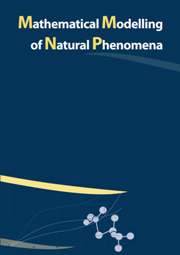Article contents
Deformable Cell Model and its Application to Growth of PlantMeristem
Published online by Cambridge University Press: 10 July 2013
Abstract
Deformable cell model is developed to study pattern formation and to simulate planttissue growth. Each cell represents a polygon with a number of vertices connected bysprings. Some cells in the tissue can grow and divide, other cells are differentiated anddo not grow or divide but remain deformable. The model is used to investigate formation ofself-similar structures which reproduce the same cell organization during their growth. Innumerical experiments we observed that self-similar solutions can exist for a ratherprecise choice of plant structure and mechanical properties of cell walls. We test themodel for simulation of apical meristems functioning which represent self-similar cellstructures in plants. At the next stage of modelling, auxin distribution is introduced bymeans of diffusion and polar transport mechanisms. The existence of steady auxindistribution in a growing root is investigated. Single as well as multiple auxin maximahave been observed in model solutions.
Information
- Type
- Research Article
- Information
- Mathematical Modelling of Natural Phenomena , Volume 8 , Issue 4: Plant growth modelling , 2013 , pp. 62 - 79
- Copyright
- © EDP Sciences, 2013
References
- 4
- Cited by

